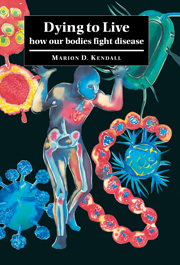10 - The New Millennium
Published online by Cambridge University Press: 29 September 2009
Summary
Future travels Visitors to a new environment are advised to protect themselves against unfamiliar pathogens. How wise is one to ignore such health recommendations? Why is it that the local inhabitants in these countries do not take the same precautions as visitors? Every individual, whilst growing up, is exposed to most of the pathogens of his/her local environment. We have already seen that mother's milk gives some protection to the newborn whilst the baby's immune system is developing. Then a baby born to a family that has stayed in one environment for several generations may inherit genes that have been selected for by their ability to give protection against locally occurring pathogens. In modern society though, there is so much more movement between countries than there was during the periods of human evolution, that genetic recombination is probably of less importance in practice than in theory. However, most children in western societies will be exposed to common colds and other common infections during childhood, and will adapt their immune system to cope with repeat challenges. Even more serious pathogens such as the tuberculosis bacillus are present in western society and many adults have been exposed to it, and gained some immunity. Thus the immune system is learning all the time which pathogens are around. Flying away for holidays or work to a completely new location means that suddenly the body is faced with new challenges it has not met before.
- Type
- Chapter
- Information
- Dying to LiveHow our Bodies Fight Disease, pp. 165 - 188Publisher: Cambridge University PressPrint publication year: 1998



